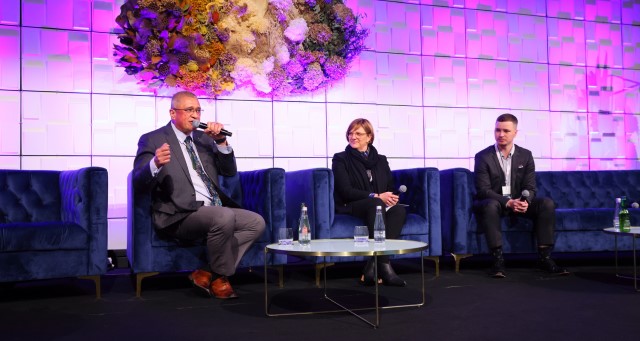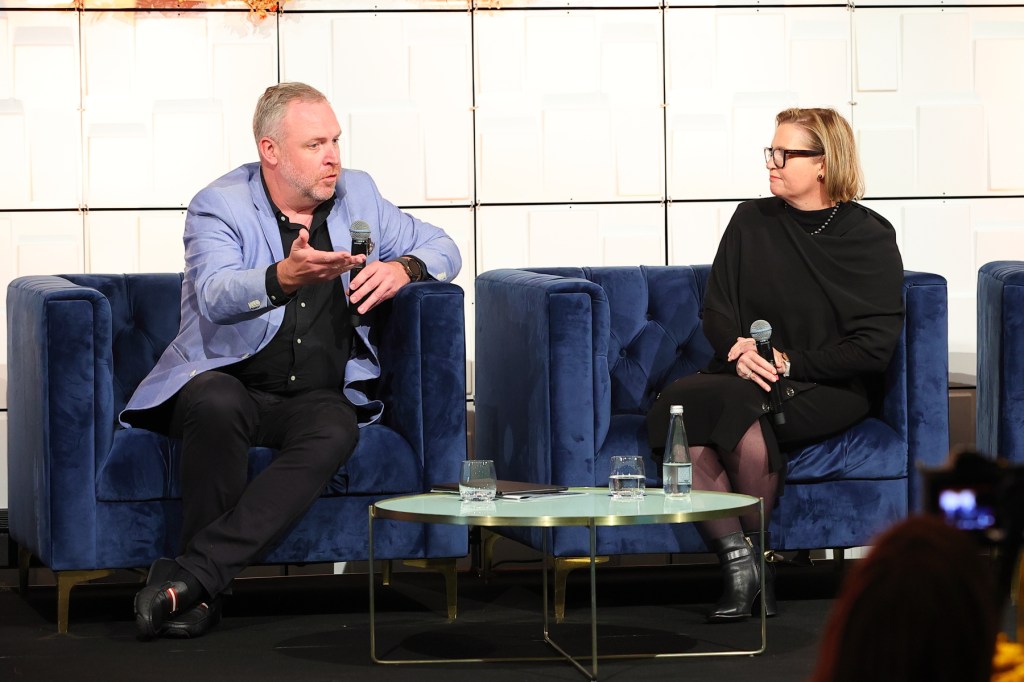Over 450 delegates were in attendance for the inaugural AHICE Aotearoa at The Pullman Auckland on Thursday.
The day started out with a Breakfast Masterclass Investment Outlook led by Colliers National Director – Hotels Dean Humphries who revealed opportunities in the New Zealand market and discussed significant deals, including an announcement that YHA’s portfolio of 10 hostels have been sold to an offshore investor. While Humphries couldn’t reveal the details of the buyer, he stated that it was a “well known tourism fund” and that this is their first investment into New Zealand.
Humphries was joined by Auckland Airport General Manger Property and Commercial, Mark Thomson, who detailed the experiences of the airline industry recovery.
“Domestic [flights] are currently about 85% of pre-COVID levels and we’re confident that is going to get to 100% by the end of the calendar year,” Thomson said.
“International is 60% at the moment and based on slot bookings – the bookings that airlines put in for international – we see that getting to 70% by the end of the year. That’s really encouraging for a number of reasons.”
Event Hospitality Director of Development Hotels and Resorts, Peter Hill, was also optimistic about the outlook for New Zealand.
“Our view long term is incredibly positive – with the opening of many markets, increased air capacity, the great appeal of New Zealand will be stronger than ever,” he said.
Aust and NZ International Investment Group (ANZIIG) Managing Director, Yesh Mudaliar, spoke to the opportunities that China will bring on reopening.
“In my opinion, the Chinese market is a sleeping giant,” he said.
“When they do return, it’s going to be a great time for hoteliers, we’ll be able to capture that market and welcome them with open arms. From the intel we have, it’s forecast to come back in the second half of next year.”
Hotel Council Aotearoa Strategic Director, James Doolan, crunched the numbers, revealing that New Zealand’s 350 hotels represent an estimated total asset value of NZ$12.25 billion. Meanwhile, STR Regional Director – Pacific, Matt Burke, delved into the data behind hotel bookings and revealed that New Zealand hotels are 50% booked for the next six months.
On the design front, experts from Pro-invest Group, Scott Carver, and more discussed the integration of culture design and the importance of sustainability in design and construction.
TOA Architects’ Nicholas Dalton discussed the Motive framework and why it’s important that when it comes to sustainability the focus is not just on the site but the also the surroundings, to uplift the whole environment.
AHICE Chair and Convenor James Wilkinson was joined by Accor Pacific CEO, Sarah Derry, who discussed the entry of Jo&Joe to New Zealand, in partnership with CP Group, as well as the entry of Tribe and Hyde, and the success of Accor’s sponsorship of Stadium Australia.
“The Accor Stadium is an incredible opportunity for us – not only the branding – inside all the individual brands come to life,” she said. “And our loyalty guests can experience it all.”
She also spoke about Accor’s partnership with Qantas and status matching, where guests can earn Qantas points when they stay at an Accor property and can earn ALL points when they fly with Qantas.
The Owners’ Outlook saw leaders from Pro-invest, Langham, CP Group and more share their insights.
CP Group New Zealand Asset Manager, Terry Ngan, discussed the importance of technology in hotel operations, guest experience, and how hotels recruit and retain staff.
He also spoke about CP Group as a leader onsustainability, becoming the first hotel group in the country to be granted a sustainability linked loan.
“That journey started 10 years ago, not last year,” he said.
“It’s a culmination of that and our strong team of ESG managers and leaders which led to our bank believing in us and funding us, and giving us KPIS to reduce carbon emissions and improve ESG.”
National Party viewpoint
New Zealand National Party Leader Chris Luxon spoke passionately about the revival of the tourism industry and his desire to work directly with industry leaders to achieve outcomes.
“I want to work in quite a different way where you generate the sector strategy,” he said.
Driving the return of international travellers and skilled workers was a key focus in his presentation.
“We need to kickstart tourism and we need to do it now,” he said.
“We have to realise when we put up barriers [to working in New Zealand], people will seek out better opportunities elsewhere and we have to compete.”
Luxon said the National Party has been calling on government to make New Zealand a more attractive destination for working holiday makers, as well as a three-month visitor visa that WHM visa holders can add onto their stay to further enjoy the country.
“The main way forward for New Zealand is value over volume,” he said.
“We need to earn more from each of our international visitors coming to New Zealand, and the likelihood of more turbulent economic times ahead of us as a global economy means accessing those higher value visitors who we found in the GFC.”
He also spoke to productivity in the tourism sector, which he said, “sits in the mid 40s”.
“If we can lift tourism productivity to be in the top 10%, we’d earn an additional $9 billion of value from tourism each year,” he said.
“Tourism can help build a pathway to greater growth and prosperity.”
F&B, technology, development
F&B experts spoke about therole of tech in food and beverage venues and how robots can boost productivity particularly during staff shortages. Plant-based food was also a top talking point, as was the importance of driving the return of skilled workers with better training, culture and motivations.
New Zealand businessman Sir Ian Taylor had a captive audience for his keynote address. He spoke about his world-leading computer graphics company Animation Research Ltd – launched at the height of COVID in 2020 – which uses Virtual Eye technology to provides real time sports graphics for the world’s biggest sporting events.
In a pre-recorded video interview, Air New Zealand’s Chief People Officer, Nikki Dines, shared the importance of diversity in the workforce, including gender and cultural diversity and hiring people with disability. Air New Zealand flights incorporate the Maori language into the service onboard.
“For those who are fluent, we want to celebrate them so that their colleagues are learning and customers are learning,” she said.
Colliers’ Dean Humphries returned for an afternoon session, highlighting the strength of the latest hotel development cycle in New Zealand, with 54 hotels built.
“I don’t think we are ever going to see a bigger development cycle – that started in 2016-2017 and will finish 2024-2025 – it’s been a real journey,” he said.
In the development outlook, panellists spoke about the rise of mixed-use developments.
“A lot of investors are looking to de-risk, so a lot of future properties will be mixed use,” said BWH Hotel Group Director of Development Performance, Elena Martiniuc.
Delegates had a lesson in culture from Sudima Rotorua Hotel Operations Manager, Awatere Douglas, and Sofitel Wellington Area General Manager, Raymond Faulkner, who taught delegates Maori song and dance.
Langham Hospitality Group CEO Brett Butcher also appeared by video interview, discussing the evolution of the Cordis Auckland and the group’s hopes to expand in New Zealand.
“We’re very keen to speak to anybody that would like to take our Cordis or Langham brand further in New Zealand,” he said.
“I think the Eaton brand fits really nicely in New Zealand. We’d like to bring the Langham brand back to Auckland. Cordis or Langham fits beautifully in Queenstown, Wellington and other destinations.”
During the final session, delegates enjoyed drinks with the bosses, with leaders from Wyndham, TFE, and more sharing some final thoughts on the future of the industry.
The event culminated in a gala reception at The Pullman Auckland.



